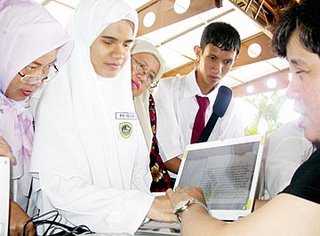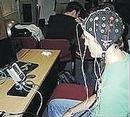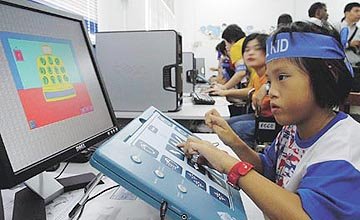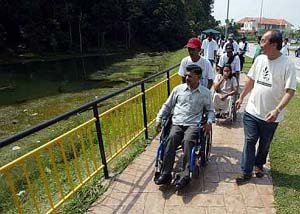Disaibltiy inclusive ICT taining in Syria
Sumber: Gokum@yahoogroups.com, 29 Disember 2006
Disabled or Not, Working With Computers Is the Future
Disabled students attend a computer training course in the newly established UNDP ICT-centre for the motor handicapped in Damascus.
Ahmad, a 17-year old student on crutches, comes every day from a village some 30 km outside of Damascus to attend computer courses in a new Computer Training Centre recently opened in the Barzeh area of Damascus.
Advanced computer training can, indeed, lead to better job opportunities for him and the other 25 physically handicapped students attending the current training programme in the centre. “I love everything about computers and the Internet, because they open new prospects for me. I am sure that I can have more chances to get a good job with a certificate in computer literacy,” he says.
Computer and Internet training courses in this new CT-Centre, that will be officially opened next month, have recently started and so far it is the only centre in Syria seeking to train people with motor disabilities.
It has been established in the framework of the “Strategic ICT Programme for Social and Economic Development in Syria” project, carried out by UNDP Syria in cooperation with the Ministry of Communications and Technology and the Ministry for Social Affairs and Labor.
The centre has 4 teachers and consists of 2 classrooms, with 16 computers each, and has a wheelchair ramp, wide doors and special tables and chairs, as well as toilets with handles, so that students can study comfortably.
It provides daily morning and evening training courses for ICDL (International Computer Driving Licence) and other areas of specialization like e-publishing, web design and web management, LAN management and data base programming.
Disabled students attending ICT courses in the centre can meet there with people facing the same challenges. Photo credit: Tahani Tayfour
After several months of training the first students will obtain their ICDL and other professional certificates and thus they will be more ready to enter the labour market. However, some of the current students, like 20-year-old Mahmood, already have a job but willing to improve their skills and career opportunities.
“I work as a book keeper for a large company. After the training at the computer center, I will be prepared for a computer-based bookkeeping,” he says.
Furthermore, “some of the students think about opening their own small IT-business,” says Ms. Kinda Khoury, the director of the centre who has been working
with disabled for many years.
Certainly there are challenges to face before these hopes can become reality. For example, Ms. Khoury hopes the centre can obtain a special bus to enable a safe and comfortable transportation of the disabled students, to and from their homes, at a reasonable cost.
Moreover, there is the need to attract more non-disabled students for the evening courses so that the centre can become financially self-sustainable after external financing from the project ends.
Indeed, the disabled students only pay a symbolic amount of tuition while non-disabled ones have to pay a standard fee for attending a training course.
“I am sure that after the official opening of the centre and the launching of an advertisement campaign we can reach this goal,” says Iyad Radwan, one of the teachers. “Working with computers is the future. No matter if you are disabled or not.”
Kay Nagata
Senior Economic Affairs Officer
Department of Social and Economic Affairs
Office for ECOSOC Support and Coordination
Development Cooperation Policy Branch
United Nations HQ
1 UN Plaza, Room DC1-1444
New York, NY 10017
Tel: 1-212-963-0696
Fax: 1-212-963-2812
Disabled students attend a computer training course in the newly established UNDP ICT-centre for the motor handicapped in Damascus.
Ahmad, a 17-year old student on crutches, comes every day from a village some 30 km outside of Damascus to attend computer courses in a new Computer Training Centre recently opened in the Barzeh area of Damascus.
Advanced computer training can, indeed, lead to better job opportunities for him and the other 25 physically handicapped students attending the current training programme in the centre. “I love everything about computers and the Internet, because they open new prospects for me. I am sure that I can have more chances to get a good job with a certificate in computer literacy,” he says.
Computer and Internet training courses in this new CT-Centre, that will be officially opened next month, have recently started and so far it is the only centre in Syria seeking to train people with motor disabilities.
It has been established in the framework of the “Strategic ICT Programme for Social and Economic Development in Syria” project, carried out by UNDP Syria in cooperation with the Ministry of Communications and Technology and the Ministry for Social Affairs and Labor.
The centre has 4 teachers and consists of 2 classrooms, with 16 computers each, and has a wheelchair ramp, wide doors and special tables and chairs, as well as toilets with handles, so that students can study comfortably.
It provides daily morning and evening training courses for ICDL (International Computer Driving Licence) and other areas of specialization like e-publishing, web design and web management, LAN management and data base programming.
Disabled students attending ICT courses in the centre can meet there with people facing the same challenges. Photo credit: Tahani Tayfour
After several months of training the first students will obtain their ICDL and other professional certificates and thus they will be more ready to enter the labour market. However, some of the current students, like 20-year-old Mahmood, already have a job but willing to improve their skills and career opportunities.
“I work as a book keeper for a large company. After the training at the computer center, I will be prepared for a computer-based bookkeeping,” he says.
Furthermore, “some of the students think about opening their own small IT-business,” says Ms. Kinda Khoury, the director of the centre who has been working
with disabled for many years.
Certainly there are challenges to face before these hopes can become reality. For example, Ms. Khoury hopes the centre can obtain a special bus to enable a safe and comfortable transportation of the disabled students, to and from their homes, at a reasonable cost.
Moreover, there is the need to attract more non-disabled students for the evening courses so that the centre can become financially self-sustainable after external financing from the project ends.
Indeed, the disabled students only pay a symbolic amount of tuition while non-disabled ones have to pay a standard fee for attending a training course.
“I am sure that after the official opening of the centre and the launching of an advertisement campaign we can reach this goal,” says Iyad Radwan, one of the teachers. “Working with computers is the future. No matter if you are disabled or not.”
Kay Nagata
Senior Economic Affairs Officer
Department of Social and Economic Affairs
Office for ECOSOC Support and Coordination
Development Cooperation Policy Branch
United Nations HQ
1 UN Plaza, Room DC1-1444
New York, NY 10017
Tel: 1-212-963-0696
Fax: 1-212-963-2812













No comments:
Post a Comment